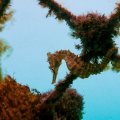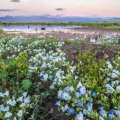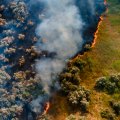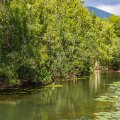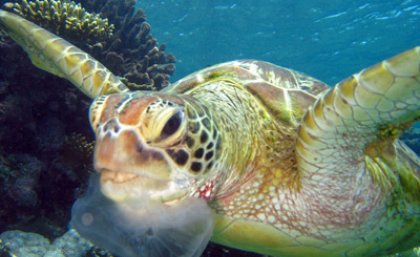
Green turtles are swallowing plastic at twice the rate they did 25 years ago, according to a University of Queensland study.
Researchers from the School of Biological Sciences and CSIRO’s Wealth from Oceans Flagship who analysed global research data from the past 25 years have found green and leatherback turtles are eating more plastic than ever before.
Study leader and PhD candidate Qamar Schuyler said turtles ate more plastic than any other form of debris.
“Our research revealed that young ocean-going turtles were more likely to eat plastic than their older, coastal-dwelling relatives,” Ms Schuyler said.
The study found that stranded turtles in areas with high concentrations of marine debris did not experience a correspondingly high probability of debris ingestion.
“Amazingly, turtles found adjacent to the heavily populated New York city area showed little or no evidence of debris ingestion, while all of the turtles found near an undeveloped area of southern Brazil had eaten debris,” Ms Schuyler said.
“This means conducting coastal cleanups is not the single answer to the problem of debris ingestion for local sea turtle populations, although it is an important step in preventing marine debris input into the ocean.
“Results from this global analysis indicate oceanic leatherback turtles and green turtles are at the greatest risk of being killed or harmed from ingested marine debris.
“To reduce this risk, man-made debris must be managed at a global level, from the manufactures through to the consumers – before debris reaches the ocean.”
An estimated 80 per cent of debris comes from land-based sources, so it is critical to have effective waste management strategies and to engage with industry to create appropriate innovations and controls to assist in decreasing marine debris.
The findings from the study are published in the journal Conservation Biology. http://onlinelibrary.wiley.com/doi/10.1111/cobi.12126/abstract
High resolution Images are available from Tracey Franchi.
Media: Ms Qamar Schuyler (Q.Schuyler@uq.edu.au, (07) 4937-3065 or 0427 566 868) or School of Biological Sciences Communications Manager Tracey Franchi (t.franchi@uq.edu.au or 3365 4831).
About the School of Biological Sciences
Through research undertaken in the School, UQ has been ranked by the 2012 National Taiwan University Rankings in the top five universities globally for research in ecology and environmental biology and in the top 18 universities globally for plant and animal biology. The UQ School of Biological Sciences attracts researchers of world standing in a range of disciplines, with international leaders in many diverse fields. Our work spans the scales of biological organisation, from molecules and cells to organisms, populations, species and communities. With more than 150 researchers working in evolution, global change biology, ecology, aquaculture, animal behaviour, physiology, entomology, zoology, botany, genomics, development and conservation biology, our researchers and graduate scientists are well-equipped to make a real difference in contributing to solving global problems.
.jpg)
